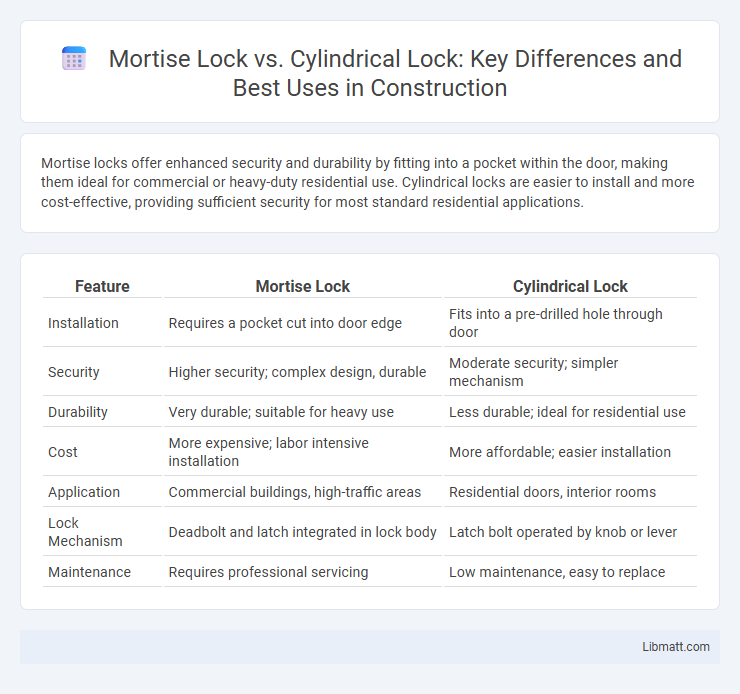Mortise locks offer enhanced security and durability by fitting into a pocket within the door, making them ideal for commercial or heavy-duty residential use. Cylindrical locks are easier to install and more cost-effective, providing sufficient security for most standard residential applications.
Table of Comparison
| Feature | Mortise Lock | Cylindrical Lock |
|---|---|---|
| Installation | Requires a pocket cut into door edge | Fits into a pre-drilled hole through door |
| Security | Higher security; complex design, durable | Moderate security; simpler mechanism |
| Durability | Very durable; suitable for heavy use | Less durable; ideal for residential use |
| Cost | More expensive; labor intensive installation | More affordable; easier installation |
| Application | Commercial buildings, high-traffic areas | Residential doors, interior rooms |
| Lock Mechanism | Deadbolt and latch integrated in lock body | Latch bolt operated by knob or lever |
| Maintenance | Requires professional servicing | Low maintenance, easy to replace |
Introduction to Mortise and Cylindrical Locks
Mortise locks are robust locking mechanisms installed by cutting a pocket into the door edge, offering enhanced security and durability ideal for commercial and high-traffic residential doors. Cylindrical locks feature a simpler installation process with a hole drilled through the door, providing cost-effective and versatile security solutions common in interior and residential settings. Your choice between these locks depends on factors like security requirements, door thickness, and installation complexity.
Understanding Mortise Locks: Features and Design
Mortise locks feature a robust design with a rectangular lock body installed inside a mortise cut into the door edge, offering enhanced security and durability compared to cylindrical locks. These locks commonly include a deadbolt and latch mechanism, providing multiple locking points and compatibility with various handle styles, making them ideal for commercial and heavy-duty residential use. Your choice of a mortise lock ensures superior resistance to forced entry and long-term reliability in high-traffic areas.
What is a Cylindrical Lock? Key Characteristics
A cylindrical lock features a round, cylindrical mechanism housed within a door, commonly used in residential and commercial buildings for ease of installation and cost-effectiveness. Key characteristics include a latch bolt that operates by a knob or lever, standardized dimensions for compatibility with various doors, and a simple mechanism that allows quick assembly and maintenance. This lock type offers moderate security and is suitable for interior doors where high security is not the primary concern.
Security Comparison: Mortise vs Cylindrical Locks
Mortise locks offer superior security compared to cylindrical locks due to their robust construction and complex locking mechanism, making them ideal for high-traffic commercial doors. Cylindrical locks are easier to install and sufficient for residential use but are more vulnerable to forced entry and lock picking. When choosing between these options, your priority should be the level of protection required for the door's location and usage.
Installation Process: Mortise vs Cylindrical Locks
Mortise locks require a more complex installation process, involving precise mortising of the door edge to fit the lock body, making it suitable for doors with ample thickness. Cylindrical locks are easier to install, needing just two standard holes drilled through the door, which simplifies replacement or retrofitting on most standard doors. Your choice between these locks should consider installation time and door compatibility to ensure optimal security and convenience.
Durability and Longevity Factors
Mortise locks offer superior durability due to their robust metal construction and complex internal mechanisms designed for heavy use in commercial and high-traffic settings. Cylindrical locks, while easier to install, often have less durable components that may wear out faster under frequent use or heavy force. Longevity is enhanced in mortise locks by their ability to be serviced and repaired without full replacement, making them a cost-effective choice for long-term security.
Cost Analysis: Which Lock is More Affordable?
Mortise locks typically cost more than cylindrical locks due to their complex installation and robust design, ranging from $60 to $250 per lock, compared to $25 to $100 for most cylindrical locks. Cylindrical locks are more affordable to install and replace, making them ideal for budget-conscious projects and residential applications. The higher upfront cost of mortise locks can be justified by their durability and enhanced security, which may reduce long-term maintenance expenses.
Aesthetic and Design Options
Mortise locks offer a sleek, customizable aesthetic with options for intricate designs and various finishes that seamlessly blend into doors, making them ideal for high-end or traditional settings. Cylindrical locks provide a more standardized, utilitarian appearance with fewer design variations, suited for modern and budget-conscious applications. Your choice between these locks should consider the desired visual impact and architectural style of your space.
Best Applications for Mortise and Cylindrical Locks
Mortise locks are ideal for commercial buildings, high-traffic areas, and historic properties where strong security and durability are essential due to their complex internal mechanisms and enhanced resistance to forced entry. Cylindrical locks suit residential homes, office doors, and interior applications where ease of installation, cost-effectiveness, and moderate security are priorities. Your choice between mortise and cylindrical locks should align with the specific security needs, door material, and usage frequency of the intended application.
Choosing the Right Lock: Key Considerations
Mortise locks offer enhanced durability and superior security with their embedded design, making them ideal for high-traffic or commercial doors. Cylindrical locks are easier to install and cost-effective, suited for residential use where convenience is a priority. Your choice should balance security needs, installation complexity, and budget to ensure optimal protection and functionality.
Mortise lock vs cylindrical lock Infographic

 libmatt.com
libmatt.com